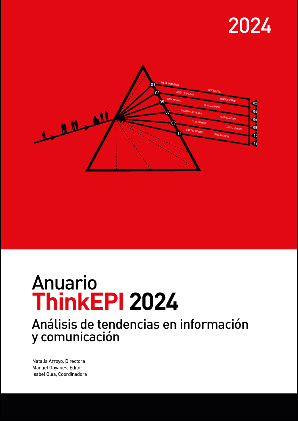(Re)imagining intelligent journalism
DOI:
https://doi.org/10.3145/thinkepi.2024.e18a02Keywords:
Artificial intelligence, Hybrid intelligence, Digital journalism, Total journalismAbstract
The emergence of the impact of Artificial Intelligence (AI) in technologically mediated communicative processes has not only opened new debates in journalism but has also put on the table, once again, its future in a network society where, despite ubiquity, truthful information circulating through different channels and in all types of formats represents a small part of the communicative flows. After the long shadows of the turbulences that have accompanied journalism in the first waves of digital transformation, the irruption of AI in newsrooms announces new opportunities and poses renewed threats, in a context of regulation and expectation about the ability to order the new scenario in favor of citizens. An analytical review of the contributions and fears raised by the new challenges animates the design of some elements that drive initiatives that seek to imagine intelligent journalism. Given that machines do not have firm commitments to truth and honesty, nor do they have all the coordinates that point them to the discipline of verification as the essence of journalism, we bet on hybrid artificial intelligence, which combines different algorithms and machine learning techniques with human knowledge and logic, as one of the best ways to achieve a more intelligent journalism -total journalism that takes advantage of all the techniques and modalities inherited from the past.Downloads
References
Anderson, Chris W. (2020). “The state(s) of things. 20 Years of journalism studies and political communication”. Comuinicazione politica (ComPol), n. 1 , pp. 47-62. https://rivisteweb.it/doi/10.3270/96422
Beckett, Charlie; Yaseen, Mira (2023). Generando el cambio. Un informe global sobre qué están haciendo los medios con IA. London School of Economics. https://www.journalismai.info/research/2023-generating-change
Eldridge II, Scott A.; Hess, Kristy; Tandoc Jr., Edson C.; Westlund, Oscar (2021). Definitions of digital journalism (Studies). New York: Routledge. ISBN: 978 0367561215
European Commission (2021). Proposal for a regulation of the European Parliament an of the Council. Laying down hharmonised rules on artificial intelligence (artificial intelligence act) and amending certain union legislative acts. COM(2021) 206 final. https://eur-lex.europa.eu/legal-content/EN/TXT/?uri=celex%3A52021PC0206
Liuzi, Alvaro (2023). “El algoritmo será el mensaje”. Medium, 13 diciembre. https://alvaroliuzzi.medium.com/el-algoritmo-ser%C3%A1-el-mensaje-585892388361#:~:text=En%20la%20era%20de%20la,y%20comprensi%C3%B3n%20de%20la%20informaci%C3%B3n
Lowrey, Wilson (2018). “Journalism as Institution”. In: Vos, Tim P. (ed.). Journalism. Berlin, Boston: De Gruyter Mouton, pp. 125-148. ISBN: 978 1501500084 https://doi.org/10.1515/9781501500084-007
McQuail, Denis (2013). Journalism and society. London: SAGE. ISBN: 9781446290811
Negreira-Rey, María-Cruz; Vázquez-Herrero, Jorge; Sixto-García, José; López-García, Xosé (eds.) (2023). Blurring boundaries of journalism in digital media. New actors, models and practices. Switzerland: Springer. ISBN: 978 3031439261
Nielsen, Rasmus-Kleis (2023). Ignore the coming election bump. Predictions ror Journaqlism, 2024. Niemanlab.org. https://www.niemanlab.org/2023/12/ignore-the-coming-election-bump
Parratt-Fernández, Sonia; Mayoral-Sánchez, Javier; Mera-Fernández, Montse (2021). “The application of artificial intelligence to journalism: an analysis of academic production”. Profesional de la información, v. 30, n. 3, e300317. https://doi.org/10.3145/epi.2021.may.17
Reporteros sin Fronteras (2023). “RSF y 16 organizaciones aliadas presentan la Carta de París sobre IA y Periodismo”. RSF.es, 13 noviembre. https://www.rsf-es.org/rsf-y-16-organizaciones-aliadas-presentan-la-carta-de-paris-sobre-ia-y-periodismo
Roe, Jasper; Perkins, Mike (2023). “‘What they’re not telling you about ChatGPT’: exploring the discourse of AI in UK news media headlines”. Humanities and social sciences communications, n. 10, 753. https://doi.org/10.1057/s41599-023-02282-w
Salaverría, Ramón (2019). “Periodismo digital: 25 años de investigación. Artículo de revisión”. Profesional de la información, v. 28, n. 1. https://doi.org/10.3145/epi.2019.ene.01
Sheikh, Haroon; Prins, Corien; Schrijvers, Erik (2023). “AI as a system technology”. In: Mission AI. The new system technology. Springer, Cham. ISBN: 978 3031214486 https://doi.org/10.1007/978-3-031-21448-6_4
Steensen, Steen; Westlund, Oscar (2020). What is digital journalism studies? London: Routledge. ISBN: 978 0367551230
Van-Dijck, José; Poell, Thomas; De-Waal, Martijn (2018). The platform society. New York, NY: Oxford University Press. ISBN: 978 0190889807 https://doi.org/10.1093/oso/9780190889760.001.0001
Zelizer, Barbie (2019). “Why journalism is about more than digital technology”. Digital journalism, v. 7, n. 3, pp. 343-350. https://doi.org/10.1080/21670811.2019.1571932
Zelizer, Barbie; Boczkowski, Pablo; Anderon, Chris W. (2022). The journalism manifesto. Cambridge: Polity Press. ISBN: 978 1509542659
Downloads
Published
How to Cite
Dimensions


